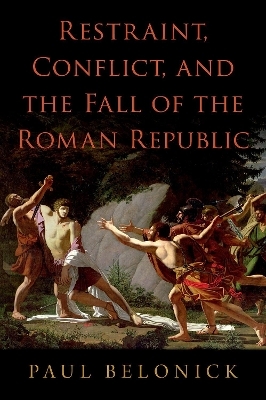
Restraint, Conflict, and the Fall of the Roman Republic
Seiten
2023
Oxford University Press Inc (Verlag)
978-0-19-766266-3 (ISBN)
Oxford University Press Inc (Verlag)
978-0-19-766266-3 (ISBN)
Restraint, Conflict, and the Fall of the Roman Republic proposes a new explanation for the collapse of the Roman Republic, arguing that the collapse was due not to lost morals, but instead to disintegration of consensus around how to apply them.
Strongly-held values can stabilize a society. They can also splinter it. In Restraint, Conflict, and the Fall of the Roman Republic, Paul Belonick explores the moral paradoxes of Republican Rome. He describes how aristocrats engaged in "performative politics," aggressively seeking self-advancement with a competitiveness that fueled the expansion of an empire. But, paradoxically, Roman orators and authors also emphasized the need for self-control, moderation, and temperance. Scholars have long suggested that this moral obsession with self-control was merely a social marker of aristocratic status, but Belonick argues that the Roman focus on self-control solidified their peculiar, competitive, semi-formal government.
Belonick then considers how values of restraint could both stabilize and de-stabilize Rome's political system. As conflicts arose over how to apply these values to novel circumstances, competitors saw each other as desecrating Republican principles and therefore as targets to be eradicated. Belonick illustrates both sides of the Roman paradox: how values of self-control legitimized the Romans' competition and supported their fluid social structure and political institutions—and then tore the Republic apart. Restraint, Conflict, and the Fall of the Roman Republic presents a fresh perspective on the collapse of one of the most prominent societies in history.
Strongly-held values can stabilize a society. They can also splinter it. In Restraint, Conflict, and the Fall of the Roman Republic, Paul Belonick explores the moral paradoxes of Republican Rome. He describes how aristocrats engaged in "performative politics," aggressively seeking self-advancement with a competitiveness that fueled the expansion of an empire. But, paradoxically, Roman orators and authors also emphasized the need for self-control, moderation, and temperance. Scholars have long suggested that this moral obsession with self-control was merely a social marker of aristocratic status, but Belonick argues that the Roman focus on self-control solidified their peculiar, competitive, semi-formal government.
Belonick then considers how values of restraint could both stabilize and de-stabilize Rome's political system. As conflicts arose over how to apply these values to novel circumstances, competitors saw each other as desecrating Republican principles and therefore as targets to be eradicated. Belonick illustrates both sides of the Roman paradox: how values of self-control legitimized the Romans' competition and supported their fluid social structure and political institutions—and then tore the Republic apart. Restraint, Conflict, and the Fall of the Roman Republic presents a fresh perspective on the collapse of one of the most prominent societies in history.
Paul Belonick is Assistant Professor of Practice at the University of California Hastings Law School.
Introduction
Part I: Values, Terms, and Patterns
Chapter One: Shame, Respect, and Deference
Chapter Two: Moderatio, Modestia, and Temperantia
Chapter Three: Setting Norms
Part II: Restraint, Conflict, and Collapse
Chapter Four: Tiberius Gracchus
Chapter Five: Uncertainty
Chapter Six: Cataclysm
Chapter Seven: The Lost Generation of the Republic
Chapter Eight: Restraint as Accelerator
Epilogue
Bibliography
| Erscheinungsdatum | 01.12.2022 |
|---|---|
| Verlagsort | New York |
| Sprache | englisch |
| Maße | 244 x 162 mm |
| Gewicht | 476 g |
| Themenwelt | Geschichte ► Allgemeine Geschichte ► Vor- und Frühgeschichte |
| Geschichte ► Teilgebiete der Geschichte ► Militärgeschichte | |
| Recht / Steuern ► Rechtsgeschichte | |
| Sozialwissenschaften ► Politik / Verwaltung ► Politische Theorie | |
| ISBN-10 | 0-19-766266-8 / 0197662668 |
| ISBN-13 | 978-0-19-766266-3 / 9780197662663 |
| Zustand | Neuware |
| Informationen gemäß Produktsicherheitsverordnung (GPSR) | |
| Haben Sie eine Frage zum Produkt? |
Mehr entdecken
aus dem Bereich
aus dem Bereich
Was Pompeji über uns erzählt
Buch | Hardcover (2023)
Propyläen (Verlag)
CHF 44,75
auf den Spuren der frühen Zivilisationen
Buch | Hardcover (2023)
C.H.Beck (Verlag)
CHF 27,95


